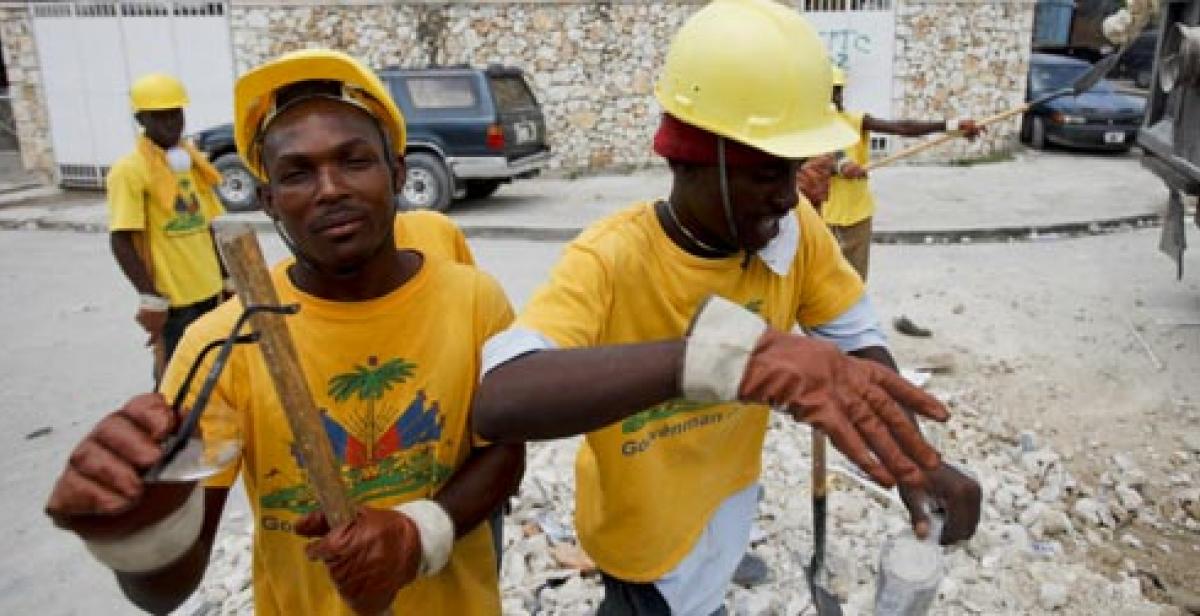Much has been achieved in the two years since the earthquake hit Haiti, but huge challenges remain. These continue to demand attention, and will only be met with better coordination between the Haitian state, Haitian civil society, and the international community, says Progressio.
“Recovery in Haiti will take a long time and will require more than just money. Better coordination and joint work between the Haitian authorities and all international and multilateral agencies involved in Haiti are crucial for all these efforts to be successful,” says Lizzette Robleto-Gonzalez, Progressio’s policy and advocacy officer. “That means NGOs, civil society, businesses, government departments both in Haiti and in donor countries like the UK remaining committed, and all working together.”
On the second anniversary of the earthquake that devastated Port-au-Prince on 12 January 2010, two million people have been rehoused, but half a million still live in tents or temporary shelter.
Haitian government capacity was badly damaged by the earthquake. It remains fragile and there is a visible lack of trust between it and sections of Haitian civil society. “For all sorts of reasons, the Haitian state remains very weak,” says Lizzette. “Civil society organisations and NGOs have filled a vacuum but the state needs to be supported to build up its own capacity and take on its proper role.”
Following the earthquake, Progressio partners and development workers supported relief efforts directly, and have also supported Haitian organisations to advocate for their concerns.
Progressio’s partner CERFAS (Centre for Research, Reflection, Training and Social Action), and Progressio development workers, have been monitoring the measures undertaken in Haiti’s reconstruction since January 2010 and have been publishing reliable data on international cooperation, public policies and the situation of Haitians. They have particularly focused on the most vulnerable sectors of the population, trying to facilitate a more effective participation of those sectors in the reconstruction process of their country.
Their analysis and observation shows that the process is slow and difficult. Just under half of the funds pledged by government donors have still to be transferred (according to UN figures), and often expenditure figures are not clearly or transparently communicated. Many Haitian civil society organisations are sharply critical that progress has not been quicker, and are calling for greater participation of Haitians themselves in decision making.
The international community is playing a crucial role in funding reconstruction and recovery – according to the Disasters and Emergency Committee, the British public donated an incredible £105 million to the Haiti earthquake appeal. Significant funds have already been spent on shelter, water and relief support, and recovery and reconstruction work continues.
Yesterday (11 January) Progressio helped coordinate two key events held at the Houses of Parliament to promote UK engagement with, and support for, Haiti.
At a joint meeting of the All Party Parliamentary Groups for Haiti and the Dominican Republic, APPG members stressed the need to strengthen the Haitian state at all levels, to build the capacity of Haitian civil society, and to bridge the gap between the two. Parliamentarians will now be holding meetings with UK ministers and at European level to promote “the right sort of engagement” with Haiti.
This was followed by a public meeting, which demonstrated that amongst politicians and UK development agencies the ideas, optimism and enthusiasm for “the right sort of engagement” exists, as does the will to harness it and put it to good use.
In Haiti and the neighbouring Dominican Republic, Progressio’s partners and development workers will continue to work with civil society organisations and local authorities on both sides of the border to improve participation, accountability and services to those rebuilding their lives after the disaster. In the year ahead, Progressio will also continue to work to keep the attention of politicians and others on Haiti.
Both meetings yesterday were attended by the Dominican Ambassador to the UK, and Progressio believes that the UK and the Dominican Republic can make a crucial contribution to recovery in Haiti, now and in the future.
“What’s needed is support for civil society, for the state, and for local authorities in Haiti and the border area,” says Lizzette. “The task looks enormous but good work has been done, and is being done, and this is not the time to take our eye off the need to support Haiti as it continues on its long path to recovery.
“We need to stop looking at Haiti as a failed state and start looking at it in a more positive light, as a country of opportunities. On this second anniversary, let’s capitalise on Haitian thinking and energy, and build the capacity of Haiti’s people and institutions to overcome the challenges they still face.”
Photo: Haitians working for the "cash for work" programme in Port-au-Prince in June, 2010. The programme hired Haitians on a day-to-day basis to help clear rubble and clean the streets. (Photo © Natasha Fillion/Progressio)



